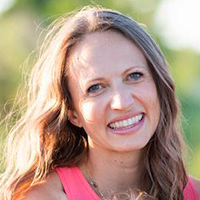Can you describe your coaching program?
Adrienne: We have built a six-month, online coaching program that takes place on a secure, members-only website, Better Together Physician Coaching. It has weekly self-study modules that folks can take at their own pace that cover topics like vision, values, setting big goals, imposter syndrome, approval addiction, how to receive feedback when it's hard.
The participants can be coached by us (Tyra and I are both certified physician coaches) in one of two ways. The first is with live-group coaching over a Zoom call that is hosted by either one of us twice a week. As many as 50 or as few as five folks will join. Anybody can raise their hand and say, "I want to come up and get coaching." They'll come up and we'll coach one-on-one with them, but in front of the whole group on any topic at all. It can be related to clinical work, relationships or anything going on for them. And we'll go back and forth with some coaching questions, and then reflective prompts before sending them back to the audience. Then the next person comes up. So usually, we coach about four people per hour.
The second way is through written coaching, which happens also on a secure part of our website where folks can write in confidentially about anything at all. And we respond back with some coaching on that topic for the whole group to read.
We studied the program in a randomized controlled trial from January 2021 through June 2021 and found that we decreased burnout (specifically emotional exhaustion), imposter syndrome and increased self-compassion in our participants compared to the control group.
Since our pilot program completed, we have gathered an incredible group of volunteer physician coaches from many institutions and specialties across the country who will begin coaching with us in the fall.
What are the differences between coaching and therapy?
Adrienne: Coaches don't diagnose or treat conditions, which is the main difference from therapy but we do help our participants manage the way they think about diagnoses they do have. So somebody might come in and say, "Gosh, I’ve been very anxious lately." We can coach them about their anxiety, but we don't treat or diagnose anxiety, depression, or anything else. Though Tyra and I are both physicians, we are very clear that we aren’t acting in the role of a physician in this program.
Additionally, in therapy, people often look to the past to make sense of how they got here. Coaching is forward facing. We take somebody where they are now and look at where they want to go. Sometimes we'll look at the past, but our objective is always to take folks from where they are now and help them move forward.
In coaching, we envision ourselves as sitting with our client or participant and helping them look at their brain, look at their thinking. We teach them a tool for metacognition or “thinking about their thinking”.
Is there a reason you chose to focus on female residents who suffer from burnout?
Tyra: Yes, there is. We get asked this question a lot. We want to be clear that our intention eventually is to grow this program and expand it to everyone – women and men, as well as all different career stages and intersections. We’re bringing this program to men in the internal medicine residency program here at CU in the fall.
We started with women because it's part of our mission to close the gap in physician burnout that exists between women and men. Women physicians and trainees are more burnt out than their male counterparts across the nation and have been for decades. We want to coach everyone, but right now women are disproportionately affected.
There are many theories as to why this is including the disproportionate amount of work at home that exists for women compared to men. So not just housework, but child care and elder care – and all of the work that goes into maintaining that – falls disproportionately to women. Then there is dealing with blatant sexism, sexual harassment threats and frequent micro-, or even macro-, aggressions at work. Finally, the cognitive load of being underrepresented in leadership, the pay-gap, and the expectation for volunteer and teaching work that falls disproportionately to women. I want to be clear that this is much more common in those underrepresented in medicine, but disproportionate to women compared to men.
You say the current physician culture is `toxic.' Can you describe what that means?
Tyra: The way that it shows up in medicine and in medical education is as a battlefield. It’s the institution vs. the individual. On the institutional side, you hear terms like, "You're not resilient enough" or "You're not practicing self-care." The solutions are these one-offs like, "Here, we'll give you a yoga class. Here's free coffee for all of our nurses. Don't you feel better now? Let's do a Zoom bread making happy hour." What we hear is that actually comes off as really condescending and patronizing. “You're giving me one more thing to do on top of everything else you haven't addressed?”
Then on the individual side, you hear blame falling to the electronic medical records, the lack of resources and the amount of work compression that’s happened over the last few decades.
Underneath both the institutional and individual arguments is this issue of culture, which is a collection of beliefs propagated by the institution and the individuals. Both institution and doctor have been indoctrinated in a culture that rests on perfectionism, overworking, even some martyrdom. We believe that coaching is a solution that can address culture through questioning beliefs and empowering change on both the institutional and individual sides.
Imposter syndrome came up so much so that you changed your curriculum to address that?
Tyra: We did. I recommend reading the Harvard Business Review article titled “Stop Telling Women They Have Imposter Syndrome”. It brings to light what I was saying in a really poignant way. It’s saying, "Hey, maybe the reason that women and people that are underrepresented in their work culture have this ‘imposter syndrome’ is because they're trying to function in a workplace that was never meant for them." And so aren't you sort of blaming the victim when you say, "Fix your imposter syndrome. We're not going to fix our work culture so that you feel included, it's your fault."
The current workforce has been raised in a culture that was not inclusive. Yes the culture, institutions and society need to change. We know that is true. And also what about those that have been raised in the toxic culture already? In coaching we ask “How can we empower them to look at those beliefs they hold? How can we teach them to question these thoughts and decide if they want to keep believing them? Or consider new thoughts that help them feel more empowered towards positive change rather than powerless and burnt out?”
Adrienne: We believe that one way for institutions to demonstrate commitment and investment in to their employees’ wellbeing is to invest in longitudinal programs like Better Together that support thriving both personally and professionally. It's more than just a yoga class here or coffee or snacks. It's an investment that in the outside world would cost an individual many thousands of dollars.
Did you feel burnt out and if so, how did it manifest in your lives?
Adrienne: Sometimes I do! This is probably an unpopular opinion for someone who does this work, but I don't think it is a reasonable goal to eliminate burnout. We can help people acknowledge when they're experiencing it, equip themselves with tools to question the beliefs driving burnout, decide what to believe and how to be empowered about changing it. So the goal isn't to eliminate burnout, but help people understand when it's popping up and have tools to confront it.
Tyra: Adrienne and I share a story of how we came to coaching. I struggled a ton in my early years. All throughout residency, I just kept thinking, "When this is over, I’ll feel better. Once I'm attending, I'll feel better." But I felt worse. I felt the worst I've ever felt in my entire life.
Nothing really helped until I got a coach myself and then enrolled in a coaching program that taught me how to look at my thoughts and how to name and process an emotion. Adrienne and I thought, "Wow, I wish I had this in training. If only I'd had these tools in training, how much toxicity could have been avoided?" And so, we created Better Together.




.png)

